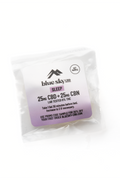We had a chance to sit down with our Director of Research + Development, Dr. Eric Dorninger, ND, LAc, to ask a few questions about insomnia and how CBD can help with falling asleep, staying asleep and getting quality sleep.
1. What are the primary causes of insomnia?
After 20 years of clinical experience, inflammation (immune system cytokine storms) is the biggest cause of insomnia. Inflammation can come from emotional, relational and professional stress, injury (like a sprained ankle) the flu or even things like altitude and overtraining. Two profound drivers of inflammation are blood sugar dysregulation and hypoxia. An example of blood sugar dysregulation is when you drink a class of wine that might help you fall asleep, but then disrupts you staying asleep. Hypoxia is usually secondary to sleep apnea.
2. What is good sleep hygiene vs poor sleep hygiene?
The brain sets up a good night's sleep by the photoreceptors in our eyes perceiving darkness and having an appropriate cortisol decrease. These two phenomena (dark room and cortisol decreasing) trigger the release of soporific Melatonin. Avoid blue light and evening screens, stress, watching the news or horror films, eating refined carbohydrates, alcohol and THC too close to bed.
3. What are some basic tips for easing insomnia that someone can try at home?
- Eat a well-balanced dinner with macros like healthy fat, protein and complex carbs.
- Supporting humor, kindness and/or generosity in your entertainment and communication choices. For example, watch a comedy and avoid arguing and table talking about heavy topics.
- Trying nutraceuticals for supporting sleep can be helpful.
- A magnesium and epsom salt bath (4 cups per bath).
- Prayer/meditation
- Reading something light
- Falling asleep to a non-screen timer book on tape or light podcast
4. When is it time to seek professional assistance, and what treatments do you recommend?
Long standing insomnia deserves professional evaluation and support. If someone is having sleep difficulty for more than 3 months, seek professional support. Being evaluated for biochemical, diet and lifestyle issues (too much caffeine, recreational stimulants, prescription stimulants, exercising too late, blood sugar swings, apnea/oxygen issues). Acupuncture can be magical for sleep issues if working with an acupuncturist who treats insomnia.
5. What should you do if you suspect you have a sleep disorder?
Your primary care provider is a great start. Request an overnight oximetry (recording your oxygen through the night) if your doctor is not evaluating the basics of sleep (first and foremost the brain needs steady fuel and steady oxygen to fall and stay asleep and wake refreshed). They can also consider a CGM (a Constant Glucose Monitor) to ensure your fuel is staying steady. If you are on a ketogenic diet, ensure adequate healthy fats are fueling your brain through the night.
6. What are some of the most common misconceptions about insomnia?
The biggest misconception about insomnia is patients and doctors blaming insomnia exclusively on stress. Inflammation and biochemical issues (blood sugar swings, nutrition, drops in oxygen and apnea) are usually the fundamental underlying causes of insomnia and the stress simply aggravates these established issues of inflammation.
Dr. Eric Dorninger is the Director of Research + Development for Blue Sky CBD. He is the founder of Roots and Branches Integrative Healthcare in Louisville, Colorado where he practices.

